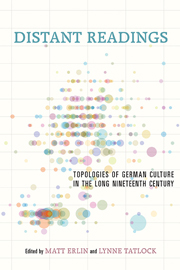Book contents
- Frontmatter
- Contents
- Acknowledgments
- Introduction: “Distant Reading” and the Historiography of Nineteenth-Century German Literature
- I Quantification
- II Circulation
- III Contextualization
- 10 The Vocations of the Novel: Distant-Reading Occupational Change in Nineteenth-Century German Literature
- 11 Big Data, Pattern Recognition, and Literary Studies: N-Gramming the Railway in Nineteenth-Century German Fiction
- 12 “Detoured Reading”: Understanding Literature through the Eyes of Its Contemporaries (A Case Study on Anti-Semitism in Gustav Freytag's Soll und Haben)
- 13 Can Computers Read?
- Selected Bibliography
- Contributors
- Index
13 - Can Computers Read?
from III - Contextualization
Published online by Cambridge University Press: 05 April 2014
- Frontmatter
- Contents
- Acknowledgments
- Introduction: “Distant Reading” and the Historiography of Nineteenth-Century German Literature
- I Quantification
- II Circulation
- III Contextualization
- 10 The Vocations of the Novel: Distant-Reading Occupational Change in Nineteenth-Century German Literature
- 11 Big Data, Pattern Recognition, and Literary Studies: N-Gramming the Railway in Nineteenth-Century German Fiction
- 12 “Detoured Reading”: Understanding Literature through the Eyes of Its Contemporaries (A Case Study on Anti-Semitism in Gustav Freytag's Soll und Haben)
- 13 Can Computers Read?
- Selected Bibliography
- Contributors
- Index
Summary
To offer possible answers to the question—“Can Computers Read?”—is to ask for trouble. Most of us have strong feelings about acceptable responses, less for philosophical reasons than because possible answers might deeply affect the future of our institutional existence as scholars and critics. Similar to the binary logic of computing at its most basic level, either a categorical “no” or a triumphant “yes” will be expected as the only viable answer, and whatever positions one develops will be applauded or rebuffed because they will challenge fundamental beliefs about what we do as academics and how we envision our role in years to come. Traditional humanists will shake their heads about the question's inherent blasphemy. They will claim that computers only know of 0s and 1s. Semantic complexity, symbolic ambiguity, and creative meaning making are essentially foreign to them. They will claim that computers calculate and follow commands, whereas true reading is a feature of the life of the mind, of our uniquely human ability to think, perceive, and feel what exceeds mere calculation. Posthumanist technophiles, on the other hand, will not hesitate to see the question as an opportunity to dismiss the dreams and delusions of Western humanism. They will respond: because matter itself is organized according to discrete or even digital principles, because mental processes function like software within the brain's hardware, because culture is much more tied to nature than constructionism has led us to believe, a computer's engagement with code and language not only is comparable to human reading but in fact tells us the very truth about human reading.
- Type
- Chapter
- Information
- Distant ReadingsTopologies of German Culture in the Long Nineteenth Century, pp. 333 - 346Publisher: Boydell & BrewerPrint publication year: 2014



